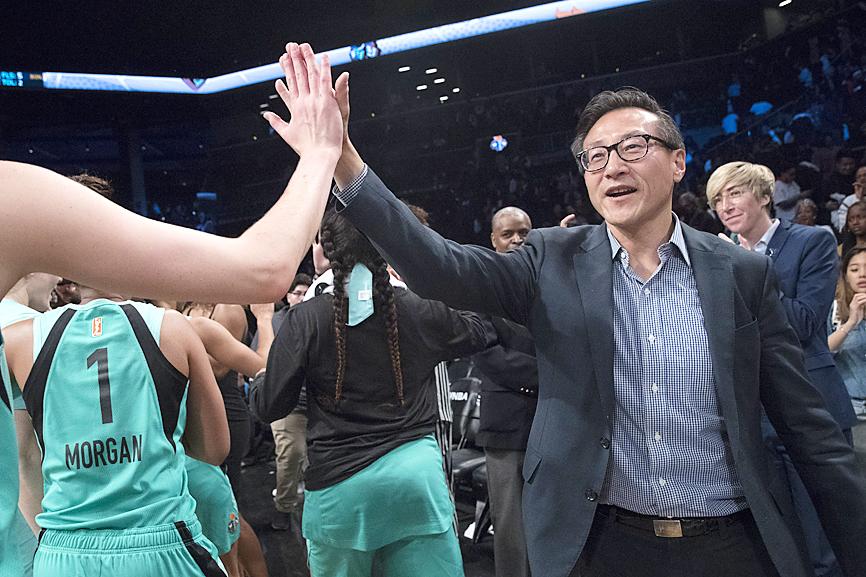Western nations are beginning to push back on moneyed interests espousing authoritarian values within their borders, as shown in a recent ESPN expose of Brooklyn Nets owner Joe Tsai (蔡崇信), Taiwanese commentators said this weekend.
The US sports news organization on Thursday published a feature on Tsai, a Taipei-born billionaire and cofounder of Chinese e-commerce giant Alibaba.
Calling him “the face of [the] NBA’s uneasy China relationship,” ESPN detailed his links to China’s techno-authoritarian expansion through Alibaba and his defense of controversial policies in Hong Kong and Xinjiang.

Photo: AP
It also investigated his role as a mediator for Chinese interests in the US, particularly in the maelstrom following a 2019 post on Twitter by then-Houston Rockets general manager Daryl Morey in support of Hong Kong protesters.
While publicly accusing Morey of “supporting a separatist movement,” Tsai was himself accused of pushing for the NBA to fire Morey in “part of a behind-the-scenes drama that reached the White House and has not been previously disclosed,” ESPN reported.
After mounting pressure from Washington, NBA commissioner Adam Silver issued a statement affirming the league’s commitment to freedom of expression, and Morey did not face any punishment.
To Taiwanese commentators, the report exposes declining patience within the US and other Western democracies for financial interests superseding human rights.
Yen Chien-fa (顏建發), a professor of business administration at Chien Hsin University of Science and Technology, on Saturday said it is becoming clear that “democratic values are more important” than economic interests, especially in the wake of Russia’s invasion of Ukraine.
Yen also pointed to Tesla founder Elon Musk’s recent criticism of Twitter for prioritizing money over free speech. Musk said the platform must be taken private to realize “its potential to be the platform for free speech around the globe.”
There has also been a business exodus from China over human rights concerns in Xinjiang and Hong Kong, Yen said.
Tsai is facing an investigation over his alleged ties to rights abuses, as universal values increasingly become the standard for evaluating business interests, he said.
Democratic Progressive Party Legislator Lai Jui-lung (賴瑞隆) expressed concern over authoritarian sympathizers using the freedoms afforded them by democracies to push their own agenda.
As the US is searching for ways to counteract their influence, Taiwan must also pick up the pace to prevent a minority group of people “fighting against freedom and democracy in the name of freedom and democracy,” he said.
What Taiwan needs is someone to fight back, Yen said.
Growing criticism of Tsai would reverberate in Taiwan as the trend that began in the US spreads to other countries, he said.

INFRASTRUCTURE: Work on the second segment, from Kaohsiung to Pingtung, is expected to begin in 2028 and be completed by 2039, the railway bureau said Planned high-speed rail (HSR) extensions would blanket Taiwan proper in four 90-minute commute blocs to facilitate regional economic and livelihood integration, Railway Bureau Deputy Director-General Yang Cheng-chun (楊正君) said in an interview published yesterday. A project to extend the high-speed rail from Zuoying Station in Kaohsiung to Pingtung County’s Lioukuaicuo Township (六塊厝) is the first part of the bureau’s greater plan to expand rail coverage, he told the Liberty Times (sister paper of the Taipei Times). The bureau’s long-term plan is to build a loop to circle Taiwan proper that would consist of four sections running from Taipei to Hualien, Hualien to

A relatively large earthquake may strike within the next two weeks, following a magnitude 5.2 temblor that shook Taitung County this morning, the Central Weather Administration (CWA) said. An earthquake struck at 8:18am today 10.2km west of Taitung County Hall in Taitung City at a relatively shallow depth of 6.5km, CWA data showed. The largest intensity of 4 was felt in Taitung and Pingtung counties, which received an alert notice, while areas north of Taichung did not feel any shaking, the CWA said. The earthquake was the result of the collision between the Philippine Plate and the Eurasian Plate, the agency said, adding

Snow fell in the mountainous areas of northern, central and eastern Taiwan in the early hours of yesterday, as cold air currents moved south. In the northern municipality of Taoyuan, snow started falling at about 6am in Fusing District (復興), district head Su Tso-hsi (蘇佐璽) said. By 10am, Lalashan National Forest Recreation Area, as well as Hualing (華陵), Sanguang (三光) and Gaoyi (高義) boroughs had seen snowfall, Su said. In central Taiwan, Shei-Pa National Park in Miaoli County and Hehuanshan National Forest Recreation Area in Nantou County saw snowfall of 5cm and 6cm respectively, by 10am, staff at the parks said. It began snowing

The 2025 Kaohsiung Wonderland–Winter Amusement Park event has teamed up with the Japanese manga series Chiikawa this year for its opening at Love River Bay yesterday, attracting more than 10,000 visitors, the city government said. Following the success of the “2024 Kaohsiung Wonderland” collaboration with a giant inflatable yellow duck installation designed by Dutch artist Florentijn Hofman, this year the Kaohsiung Tourism Bureau collaborated with Chiikawa by Japanese illustrator Nagano to present two giant inflatable characters. Two inflatable floats — the main character, Chiikwa, a white bear-like creature with round ears, and Hachiware, a white cat with a blue-tipped tail